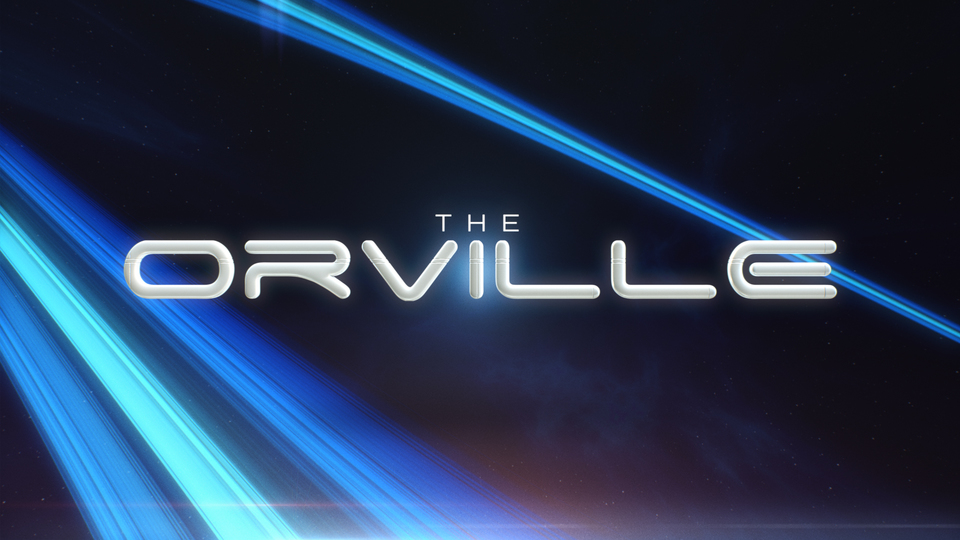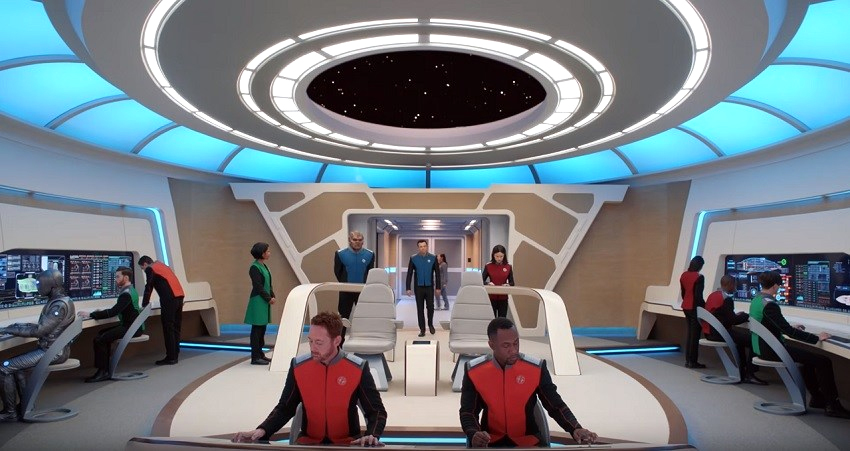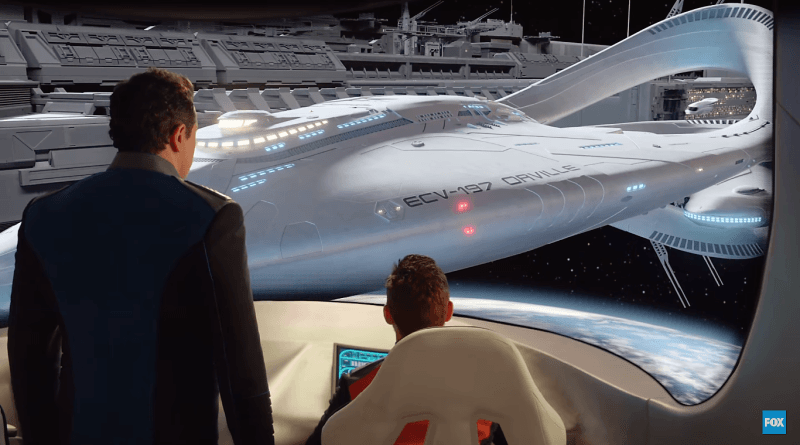SUPERVERSIVE Reviews: The Orville, Episode One.
Tuesday , 12, September 2017 Superversive 6 Comments I am not a fan of Seth McFarlane. I find Family Guy about 95% annoying, 4% dumb, and about 1% funny. I can’t stand even the commercials for American Dad, so I’ve never given it a shot, except where someone is watching it in the break room at work. So it was really weird to me when I saw the initial trailers for The Orville and didn’t immediately hate everything about what I’d seen. Maybe it was the influence of Jon Favreau. But then something far stranger happened: in interviews with Seth McFarlane, he wasn’t sounding like the kind of guy who would make Family Guy. He talked about his sorrow over the current fixation of sci-fi with grim dystopias and lamented the death of hopeful, optimistic sci-fi. He talked about his love for classic Star Trek and shows like The Twilight Zone with a big idea behind them. He put forth a mission statement for The Orville that declared it must be “fun, dramatic, and aspirational.” He sounded, if not superversive, exactly, then like someone whom superversion could happily call a friend. (Gotta say, I never saw that one coming.) With the premier of The Orville finally here, we can now sit back and examine McFarlane’s work to see how it held up to his goals.
I am not a fan of Seth McFarlane. I find Family Guy about 95% annoying, 4% dumb, and about 1% funny. I can’t stand even the commercials for American Dad, so I’ve never given it a shot, except where someone is watching it in the break room at work. So it was really weird to me when I saw the initial trailers for The Orville and didn’t immediately hate everything about what I’d seen. Maybe it was the influence of Jon Favreau. But then something far stranger happened: in interviews with Seth McFarlane, he wasn’t sounding like the kind of guy who would make Family Guy. He talked about his sorrow over the current fixation of sci-fi with grim dystopias and lamented the death of hopeful, optimistic sci-fi. He talked about his love for classic Star Trek and shows like The Twilight Zone with a big idea behind them. He put forth a mission statement for The Orville that declared it must be “fun, dramatic, and aspirational.” He sounded, if not superversive, exactly, then like someone whom superversion could happily call a friend. (Gotta say, I never saw that one coming.) With the premier of The Orville finally here, we can now sit back and examine McFarlane’s work to see how it held up to his goals.
McFarlane’s Ed Mercer is a once promising officer who has spent the last year as a discipline problem after finding (in a prologue in the first few minutes of the show) his wife in bed with someone else. Despite the fact that he’s not been anyone’s idea of an exemplary officer recently, the Planetary Union’s got a lot of ships and decides to put Mercer in command of the Orville, a mid-range exploratory ship, after her captain retires.

The situation is half “We’re giving you one last shot” and half “we have 3,000 ships, sooner or later we’re going to scrape the bottom of the command barrel,” but Mercer enthusiastically agrees to shape up in exchange for the command. The Orville is crewed by a decent late-era Trek collection of characters: mostly human, but more than a few token aliens, including his young security chief (Essentially an affirmative action hire, despite the super strength of her species), a robot from a notoriously racist species of robots, and a second officer whose species seems to draw on both Vulcans and Mass Effect‘s asari. The Orville‘s first mission is a routine supply drop that turns out to be anything but routine; the scientists stationed at the outpost have developed a means of accelerating time within a contained space. While the device to speed up things like crop growth and wound healing, the scientists were savvy enough to realize its potential as a weapon but ill equipped enough not to have a reliable means of signaling the Federation Planetary Union and so lie in order to avoid drawing the attention of the local Klingon-analogues. Oh, and on the way, they have to pick up Mercer’s XO– and it turns out that the only one available is his ex-wife. Hijinks ensue.
So how well does The Orville work? It’s funny. It’s on the crude side a bit, but the humor isn’t really anything like you see in McFarlane’s animated work– by which I mean, it’s genuinely funny rather than strangely grating. One complaint is that the humor doesn’t feel organic to the script, and I think that might be the one artifact of McFarlane’s style on Family Guy, in which nonsense “skits” tend to interrupt the overall arc of the show. If we’re telling serious sci-fi in a comedic manner, we should probably be aiming for something like Firefly in terms of humorous moments, or perhaps Stargate SG-1. Or even Star Trek’s more humorous episodes, such as Deep Space Nine‘s brilliant “In the Cards.” (Soulless minions of orthodoxy!)
 And how does The Orville fair at telling serious sci-fi? I’d say probably a B+. The premier’s episode is solid, but doesn’t make any kind of sci-fi splash. Now, premiers are generally weak, and plenty of shows with rocky beginnings grew into well-loved franchises (I’m looking at you, SG-1.) but it makes me a little nervous for The Orville. No in terms of its potential, but in terms of getting enough time to develop its potential– because potential it has. Where The Orville really succeeds is in hitting the Star Trek notes. The world is clearly a Star Trek world, and you can tell that these people feel about their ships the way the TOS crew felt about the Enterprise. There’s a short homage to Star Trek: The Motion Picture‘s shuttlepod approach scene (Which Brad Torgersen insightfully compared to a burlesque striptease) that makes it clear that Mercer loves his ship at first sight.
And how does The Orville fair at telling serious sci-fi? I’d say probably a B+. The premier’s episode is solid, but doesn’t make any kind of sci-fi splash. Now, premiers are generally weak, and plenty of shows with rocky beginnings grew into well-loved franchises (I’m looking at you, SG-1.) but it makes me a little nervous for The Orville. No in terms of its potential, but in terms of getting enough time to develop its potential– because potential it has. Where The Orville really succeeds is in hitting the Star Trek notes. The world is clearly a Star Trek world, and you can tell that these people feel about their ships the way the TOS crew felt about the Enterprise. There’s a short homage to Star Trek: The Motion Picture‘s shuttlepod approach scene (Which Brad Torgersen insightfully compared to a burlesque striptease) that makes it clear that Mercer loves his ship at first sight.
Personally, I enjoyed the characters. One or two people said they found Mercer grating; I thought he was human and likable. I found most of the characters likable, actually, even his ex-wife, who (mild spoilers) clearly still cares about him in a way that is… actually commendable. That might be what left the best taste in my mouth, actually; for all that she clearly cheats on him, she both regrets and is concerned for his well-being in a way that isn’t overbearing. She’s not a flawless action girl with the personality of a harpy, she’s a human being who still loves her former husband.
Is The Orville perfect? Nah. It has its flaws. But I’ll be darned if it’s not fun, and I’ll be darned if I’m not looking forward to the next episode.
Joshua M. Young is an underemployed theologian, sci-fi author (featured in Tales of the Once and Future King, Forbidden Thoughts, and author of the forthcoming novel Do Buddhas Dream of Enlightened Sheep) and blogger at Superversivesf.com. He can be reached on Gab.ai and Twitter @BadgerSensei. If you enjoyed this, we’d love to have you visit our main site!
You can catch the replay of The Orville at Fox here:
https://www.fox.com/watch/2ae78a0e3d34f92628300a8ad460b3ec/
I thought it was funny, especially the Arbor Day punchline, and the adventure was good Kirk-Scotty-Spock stuff.
However, the cheating ex-wife with a heart of gold and the softball humor with the diversity hires might go the way of Pink. I’d prefer Mike Judge be involved.
Also, the Klingons were worse shots than Imperial Stormtroopers. More of the landing crew should have gotten shot up – the superstrong little girl could have taken a few gunshots.
The parts that were promising were the genius physicist getting zapped by her own horrible device, the lazy navigator obsessed with soda privileges, and the pilot who “rides the donkey.”
The stupid ejaculate at the very beginning set the wrong tone and really had nothing to do with the rest of the tone of the show. They should avoid that stuff altogether. Also, I think when Captain Kirk changed his mind on his XO-ex, it took quite a bit of zip out of their tense relationship for the next episode.
But I’ll definitely watch again.
Lord works in mysterious ways.
I still think that it’s potential will be squandered. The deal to demonize will be too strong to thwart
I found it a good start. Weak in spots, like the gunfight and space battle. I agree the opening scene could have used a cut. If they go ahead playing it as straight, but with numerous dialogue and situations, with the occasional slapstick, it will keep my attention. If they get into silly plots or humor not appropriate to the scenes, they’ll lose me.